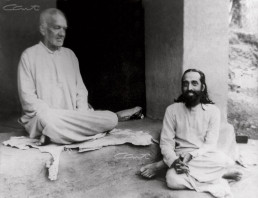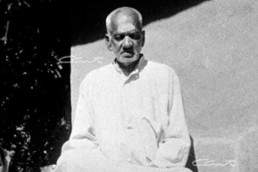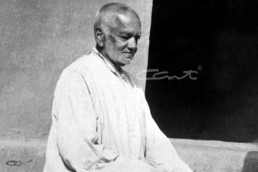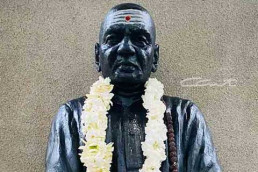
By Swami Chinmayananda
This is an article penned by Pujya Gurudev where he fondly shares some memories of his Guru, Swami Tapovan Maharaj. This article was published in the December 1971 edition of Tapovan Prasad.

By Swami Chinmayananda
This is an article penned by Pujya Gurudev where he fondly shares some memories of his Guru, Swami Tapovan Maharaj. This article was published in the December 1971 edition of Tapovan Prasad.
Here, when I am lying helplessly under treatment in the clinic, my thoughts wander away to Tapovan Kuti on the Ganges banks in Uttarkasi and to the period when I was doing my sadhana there. In this peculiar mood of relaxed memories, many remarkable anecdotes of Sri Gurudev (Swami Tapovanam) explode in my recollections. It is surprising how in my continuous preoccupation with my self-chosen missionary work, I had, all these years, forgotten the brilliant flashes of Sri Gurudev’s ready wit and sparkling wisdom.
I don’t exactly remember the specific occasions that brought up these live examples from him, but each one of them was a glorious answer to some question, or a blazing explanation of some moot point in higher Vedanta.
Once upon a time, described Sri Gurudev, a secular tyrant made a Mahapurusha hang from the branch of a tree by his teeth. Down below flowed the noisy Ganga, smashing her way through a bed of large rocks. At that time a seeker asked, “Sir! Tell me the nature of the Infinite Self.” If the Mahapurusha opened his mouth either to assert or to negate the Self, he would dash himself into the rocky floods; if he remained silent, the student would be neglected, which was against the Mahatma’s sole duty in life. How would he express?
“It is then,” concluded Sri Tapovanam “perhaps, that the Master showed the student the jnana mudra, meaning that the Self is not to be discussed. It is to be realised by oneself in the silence within.” Both assertion and negation are functions of the intellect. Beyond them both is the transcendental Self, the seat of pure Consciousness.
व्यवहार्यमग्राह्यम अलक्षणमचिन्त्यमव्यप-देश्यमेकात्मप्रत्ययसारं प्रपञ्चोपशमं शान्तं
शिवमद्वैतं चतुर्थं मन्यन्ते स आत्मा स विज्ञेयः॥
nāntaḥprajñaṃ na bahiṣprajñaṃ nobhayataḥprajñam na prajñānaghanaṃ na prajñaṃ nāprajñam. adṛṣṭama-
vyavahāryamagrāhyam alakṣaṇamacintyamavyapa-deśyamekātmapratyayasāraṃ prapañcopaśamaṃ śāntaṃ
śivamadvaitaṃ caturthaṃ manyante sa ātmā sa vijñeyaḥ..
It is not that which is conscious of the internal subjective world, not that which is conscious of the external world, not that which is conscious of both, nor that which is a mass of Consciousness, nor that which is simple Consciousness, nor is it unconscious. It is unseen by any sense organ, unrelated to anything, incomprehensible by the mind, uninferrable, unthinkable, indescribable, essentially of the Self alone, negating all phenomena; it is peaceful, all bliss and non-dual. This is what is known as the fourth (turiya). This is the Atman and this is to be realised.1
“A Vedantic teacher was once approached by a mahatma one afternoon,” said Sri Gurudev, “asking him with all reverence, ‘Explain to me, sir, the nature of the Self.’”
“The great master looked at the young monk, winked at him and said, ‘I will tell you all about it when there is no one here.’
“After a time, the anxious and sincere mahatma reached the teacher and reminded him, ‘Now there is nobody here, sir. Please instruct me.’ The Vedantic teacher did not open his eyes, nor did he reply. The mahatma waited for some time, and thinking that perhaps the teacher had not heard, repeated the request.
“The Vedantic saint smiled and said, ‘Not now. Let everyone go away.’
’Sir, everyone has gone; there is nobody here. I am alone here,’ asserted the student.
‘So long as you are here,’ snap came the answer, ‘how can I tell the Truth?’
“Where the ego has ended, and the clamour of all thoughts has been entirely hushed up, in that ‘living-silence’ is the self realised,” concluded Sri Gurudev. I was immature then. From immaturity springs all the audacity of fools. So I asked, “Sir, who is it in the mahatma that knows that there is nobody there?”
Like lightning came the reply: “That, even the wisest do not know.” The vigour and suddenness of the reply then satisfied me. Only now I realise the wisdom of the ready reply. The Self is never an object for anyone’s intellectual appreciation as knowledge.
yato vāco nivartante aprāpya manasā saha
That from which speech and mind return, unable to reach or apprehend — that is the supreme state of the Self.2
Once, a young man came all the way from Sri Gurudev’s native village in Kerala. This man must have rushed out of his home in a moment of economic crisis. However, he had deep devotion and an ardent sense of reverence towards Sri Gurudev. He announced himself as a distant relative of Sri Swami Tapovanam and narrated non-stop the present welfare and well-being of various members of the ‘family’ in Kerala, in its various ‘branches’.
All the time — it was more than an hour — Swamiji sat, listening to the music of the roaring Ganges. Now and then he gave an encouraging and indulgent “Hm… Hm… Hm…” to the young man’s unilateral bombardment.
In the stream of his empty talks, he mentioned his present state of need and poverty. Finally, as an apology for coming without some gift, he said, “What would you say if I came to you empty-handed!”
Snap came the answer from Sri Gurudev, “Drop it down.”
But the noisy speaker, in his incorrigible innocence, went on, “I said, if I came to you really empty-handed?”
The answer shot out from Sri Gurudev, “Then gather and carry away as much you can!!”
When the mouth is noisy, little do we understand what others say, and much less can we comprehend what our mystic masters indicate with their rare words.
The young man understood nothing. He grinned, and Swamiji with a knowing look at me, smiled at the visitor. The visitor was consoled. He must have considered it as some joke Swamiji had cracked, which of course, he could not understand! The young man from Kerala continued his reports of his native village. Swamiji, still smiling, moved his eyes from the visitor to the refreshing flow of the ever-pure mother Gangaji!! Only empty hands can gather and carry away even when given freely by another.
1 Mandukya Upanishad, 7
2 Taittiriya Upanishad, 2.9
Previous Topic
Mandukya Upanishad
Swami Tapovan Maharaj sent this message to our Pujya Gurudev, Swami Chinmayananda, on the occasion of his Jnana Yajna on the…
Next Topic
One Goal – Many Paths
Swami Tapovan Maharaj beautifully and concisely explains how the three paths of Bhakti, Karma Yoga and Yoga all help to…
Home Page
Homage to Sri Swami Tapovanam
The 50th anniversary edition of Tapovan Prasad (December 2011) was entirely dedicated to our Paramaguru Swami Tapovan…


